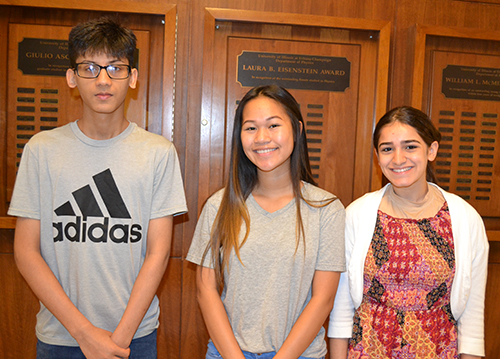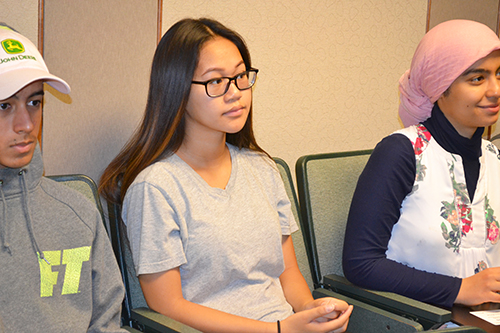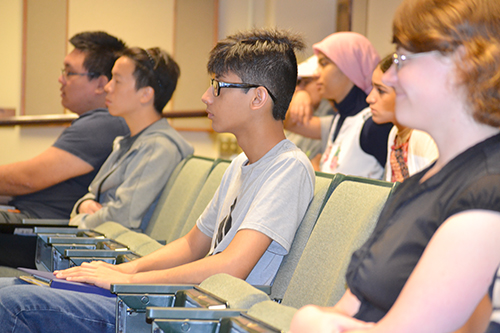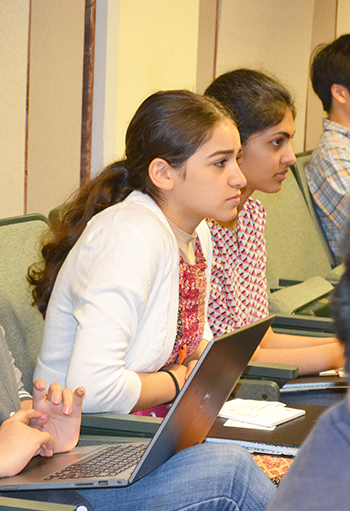SPHERES Fosters the Next Generation of Scientists and Engineers Via Research Opportunities for Local High School Students

2018 SPHERES high school students.
June 20, 2018
Are you a local high school students who'd like to get paid to assist world-renowned scientists with their cutting-edge research plus expand your horizons while preparing for college? If so, you might want to consider SPHERES (Sparking High Schoolers’ Excitement for Research in Engineering and Science), which sounds like a win-win, both for Illinois and the students. New this summer, SPHERES aims to engage local community high school students in an opportunity to gain research experience at a world-class research university under the mentorship of several people who are invested in fostering the next generation of scientists and engineers.
Though not currently grant-funded, SPHERES is sponsored by the Carle Illinois College of Medicine, the Bioengineering Department at the University of Illinois at Urbana-Champaign, and EBICS (Emergent Behaviors of Integrated Cellular Systems), and hopes to be a sustainable program for the years to come.
According to one of the coordinators of SPHERES, Krista Smith, their overarching goal is to increase underrepresented minority representation and participation in science and engineering. “There's a lot of impact that can be made as an instructor in engineering, especially as a member of an underrepresented group, which one of the goals of SPHERES is to increase the number of underrepresented members in the field. The more leaders, instructors, faculty, and people in a mentorship role for the next generation of scientists and engineers that we can see are from an underrepresented group, the better because then it will generate more of a representation of those groups. That's the goal anyway.”
SPHERES is hoping to accept five to seven rising juniors and seniors from Champaign Unit 4 or Urbana District 116 high schools that are interested in science and technology. However, the first cohort was comprised of three students. This six-week program began on June 18th with eight hour work days and will conclude on July 27th with a poster session highlighting the research conducted while participating in SPHERES. Students must be 16 or older and either a US citizen or permanent resident to be considered.

SPHERES participant Vy Truong (center) during the June 18th orientation.
Smith adds that although this is a summer program, she hopes students will continue their work into the academic year. “It's a summer program that we're starting with local high school students to bring them into our laboratories for the summer, but the expectation is that they will continue to work into the academic year, too. The idea is to— instead of having them go off and work a summer job, we will bring them into our labs and hopefully get them interested in what we do by encouraging them to pursue a major in a science or engineering discipline and pay them, so it's a win-win for everyone.”
Participants of the program will receive five-pronged mentorship from a faculty member that holds an appointment in at least two of the three aforementioned affiliates, a teacher that will serve as a mentor at weekly meetings, a graduate student researcher, an undergraduate student researcher, and SPHERES staff members.
In addition to receiving multiple layers of mentorship, students will learn to become acclimated to a university setting, find their niche in the science community by conducting basic and applied research in Illinois’ Bioengineering labs, and gain confidence in attending college through their participation in weekly seminars related to research projects, college readiness, and scientific communication.

2018 SPHERES participant (center).
Smith visited Centennial High School to discuss SPHERES with some of the students and found out that some of the students interested in participating in SPHERES were previously involved in the POETS (Power Optimization for Electro-Thermal Systems) program. She recalled asking the student about their experience in the program: “When we asked them about their experience, one of the students said, and I thought it was really cool, ‘I liked it because they didn't treat me like a high school kid. They treated me as a member of the team and you had to pull your weight because they weren't going to babysit you and hold your hand since you're a high school student.’ We want to integrate them into the daily functions of the lab culminating in a small poster or oral presentation at the end of the program. We have high standards for them.”

SPHERES participant Banan Garada.
When asked for reason they got involved in SPHERES, co-coordinators Krista Smith and Dot Gordon finished each other’s sentences in a heartwarming response. “Neither one of us are scientists. The science is fascinating to us, but we love interacting with the students…and we love bringing them in here to show off our facilities, equipment, staff, and people, and they always go away feeling like they got something out of [their experience].” Gordon adds that she loves the work because “you can see the things we’re doing are awesome and it’s fascinating.”
Smith also adds that she wants to make an impact somewhere. “I want to make an impact somewhere through my career and one of my personal interests is just equality and social justice as a whole, so if I can combine those two things, I think that is why I'm doing this. This is a way for me to personally feel like I've made an impact on someone's life career. This is something that needs to be for the greater good.”
Story by Brittany Rhed, I-STEM undergraduate student, Photos by Elizabeth Innes, Communications Specialist, I-STEM Education Initiative.
More: 8-12 Outreach, Engineering, 2018













.jpg)
















